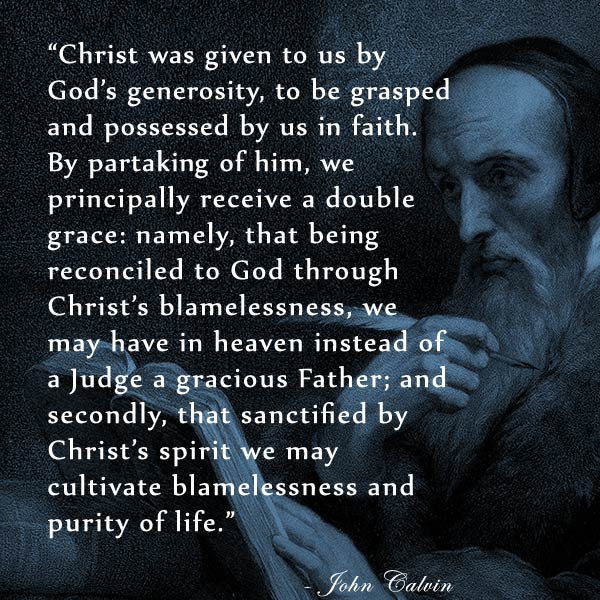Christ, Our Great Substitute
by Thaddeus Williams
“For our sake he made him to be sin who knew no sin, so that in him we might become the righteousness of God.”
(2 Corinthians 5:21)
What is substitutionary atonement?
The cross of Jesus is where the substitutionary atonement happened. On the cross, Jesus served as our substitute and atoned for our sin (2 Corinthians 5:21).
At the cross, our sin became Christ’s sin, our blameworthiness became Christ’s blameworthiness, the wrath we deserve from an infinitely just Being became the wrath He absorbed from an infinitely just Being. It made salvation possible for spiritually dead sinners wrought with guilt. As if this weren’t good news enough, Christ’s blamelessness became our blamelessness, Christ’s reward became our reward, Christ’s perfection our perfection, and Christ’s confident standing before the holy and just Father became our confident standing before the holy and just Father.
We can no more improve on Christ’s imputed righteousness than we can count past infinity.
“This is our acquittal: the guilt that held us liable for punishment has been transferred to the head of the Son of God…We must, above all, remember this substitution, lest we tremble and remain anxious throughout life—as if God’s righteous vengeance, which the Son of God has taken upon himself, still hung over us….[To] take away all cause for enmity and to reconcile us utterly to himself, he wipes out all evil in us by the expiation set forth in the death of Christ; that we, who were previously unclean and impure, may show ourselves righteous and holy in his sight.”
(John Calvin, Institutes of the Christian Religion, vol. 2, pp. 506, 510)

 Yes, I believe God ordains all that comes to pass (Eph 1:11) If a calamity occurs in a city has not the LORD done it?" (Amos 3:6). After losing all ten of his children after a great wind had caused the collapse of his son's house, Job says, "The LORD gave and the LORD has taken away. Blessed be the name of the LORD" (Job 1:21). After being covered with boils he says, "Shall we indeed accept good from God and not accept adversity?" (Job 2:10). Our world has been under judgment since the Fall, so there is sickness, death and calamity.
Yes, I believe God ordains all that comes to pass (Eph 1:11) If a calamity occurs in a city has not the LORD done it?" (Amos 3:6). After losing all ten of his children after a great wind had caused the collapse of his son's house, Job says, "The LORD gave and the LORD has taken away. Blessed be the name of the LORD" (Job 1:21). After being covered with boils he says, "Shall we indeed accept good from God and not accept adversity?" (Job 2:10). Our world has been under judgment since the Fall, so there is sickness, death and calamity. When the Holy Spirit regenerates a man and joins him to Christ, He shows him the heinousness of his sin. Seeing he cannot save himself from it, the sinner appeals to Christ to deliver him both from 1) sin's guilt and 2) from its power; from God's wrath and from sin's bondage; to not only justify him, but to sanctify him --- to apply the double cure. Christ did not die for our sin so we could have peace with sin but so that we would go to war with sin. No regenerate man says 'Lord forgive my guilt but leave me in my bondage to my sin.' No, by the grace of God, he flees from sin to Christ for salvation - salvation from God's wrath as well as deliverance from our sinful self, for the power of the Spirit to put off sin. So unlike some modern teaching, salvation does not merely consist of being delivered from God's wrath but includes much more. Many in the justification-only crowd and some liberal theologians have used this theology as an excuse to live in sin. But as J. I. Packer once said, "A half-truth masquerading as the whole truth becomes a complete untruth."
When the Holy Spirit regenerates a man and joins him to Christ, He shows him the heinousness of his sin. Seeing he cannot save himself from it, the sinner appeals to Christ to deliver him both from 1) sin's guilt and 2) from its power; from God's wrath and from sin's bondage; to not only justify him, but to sanctify him --- to apply the double cure. Christ did not die for our sin so we could have peace with sin but so that we would go to war with sin. No regenerate man says 'Lord forgive my guilt but leave me in my bondage to my sin.' No, by the grace of God, he flees from sin to Christ for salvation - salvation from God's wrath as well as deliverance from our sinful self, for the power of the Spirit to put off sin. So unlike some modern teaching, salvation does not merely consist of being delivered from God's wrath but includes much more. Many in the justification-only crowd and some liberal theologians have used this theology as an excuse to live in sin. But as J. I. Packer once said, "A half-truth masquerading as the whole truth becomes a complete untruth." A common misunderstanding about amillennialism is that “covenant theologians regard the kingdom of God as a wholly invisible and wholly present reality with no future, earthly fulfillment.” It is argued that because amillennialists have no place in their eschatological scheme for Jesus reigning upon a earthly throne in Jerusalem, they therefore by necessity have no place for an earthly, consummated kingdom. Far to the contrary, the amillennial position on the nature of God’s kingdom is that it is both a present and future reality – i.e., that it is both already-and-not-yet, inaugurated but not consummated – and that both these present and future elements of the kingdom include spiritual as well as earthly dimensions. This fulfillment, however, will not take place during a future millennial period but rather at the end of the age when Christ returns and heaven and earth are renewed. To say that because amillennialists do not affirm Christ’s earthly reign “from a throne in Jerusalem” then they cannot affirm an earthly future for God’s kingdom is to confuse a particular (premillennial) understanding of what Christ’s reign will look like with the broader category of God’s kingdom. Such an assertion would be similar to an amillennialist saying that because premillennialists do not affirm that Satan is currently bound so they cannot affirm the current, spiritual presence of God’s kingdom.
A common misunderstanding about amillennialism is that “covenant theologians regard the kingdom of God as a wholly invisible and wholly present reality with no future, earthly fulfillment.” It is argued that because amillennialists have no place in their eschatological scheme for Jesus reigning upon a earthly throne in Jerusalem, they therefore by necessity have no place for an earthly, consummated kingdom. Far to the contrary, the amillennial position on the nature of God’s kingdom is that it is both a present and future reality – i.e., that it is both already-and-not-yet, inaugurated but not consummated – and that both these present and future elements of the kingdom include spiritual as well as earthly dimensions. This fulfillment, however, will not take place during a future millennial period but rather at the end of the age when Christ returns and heaven and earth are renewed. To say that because amillennialists do not affirm Christ’s earthly reign “from a throne in Jerusalem” then they cannot affirm an earthly future for God’s kingdom is to confuse a particular (premillennial) understanding of what Christ’s reign will look like with the broader category of God’s kingdom. Such an assertion would be similar to an amillennialist saying that because premillennialists do not affirm that Satan is currently bound so they cannot affirm the current, spiritual presence of God’s kingdom. Just a couple of comments on one of the articles in the
Just a couple of comments on one of the articles in the  While peace and global unity are laudable pursuits (on the surface), such goals ought to be seen in the light of what took place at the Tower of Babel (
While peace and global unity are laudable pursuits (on the surface), such goals ought to be seen in the light of what took place at the Tower of Babel (